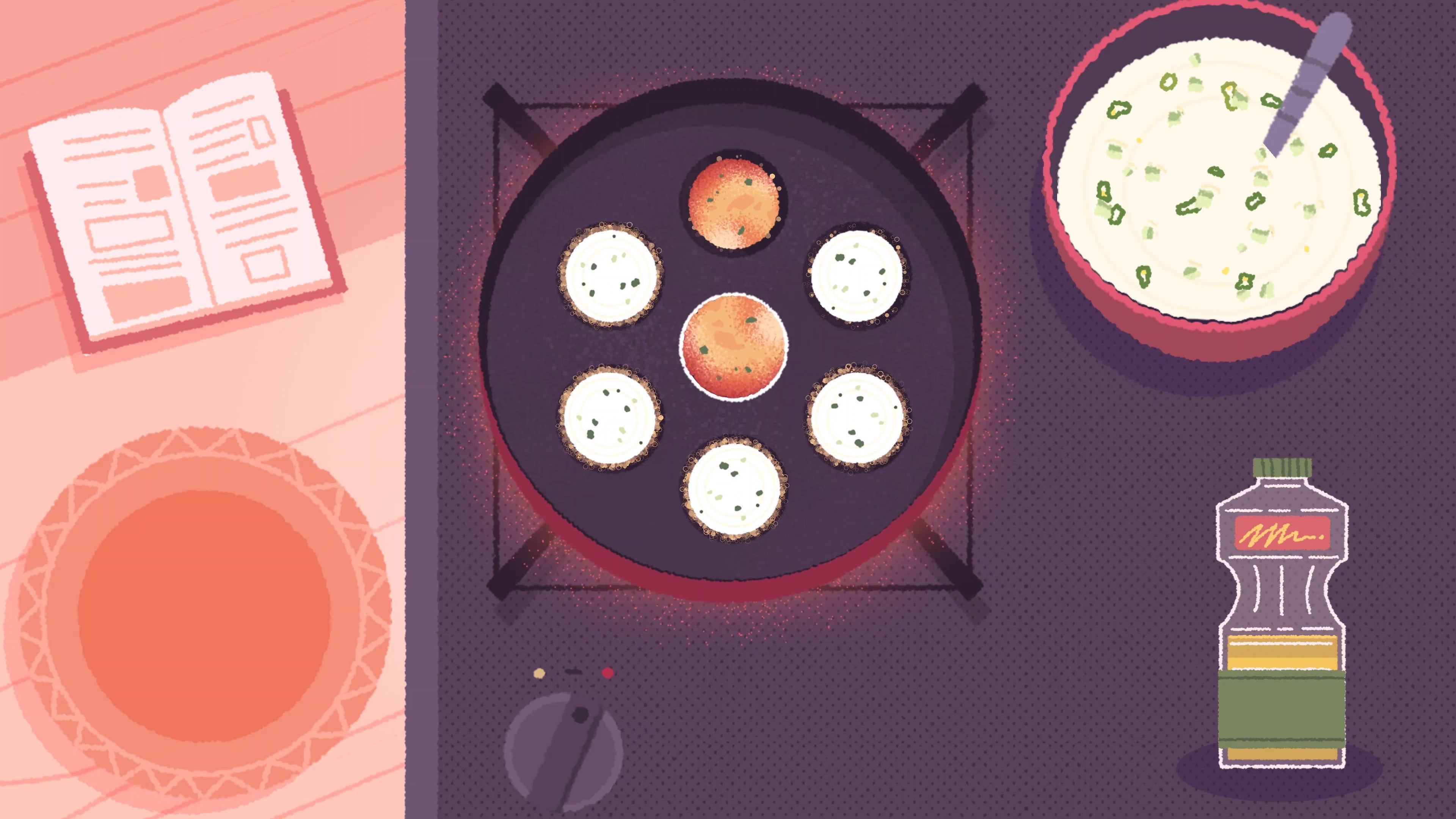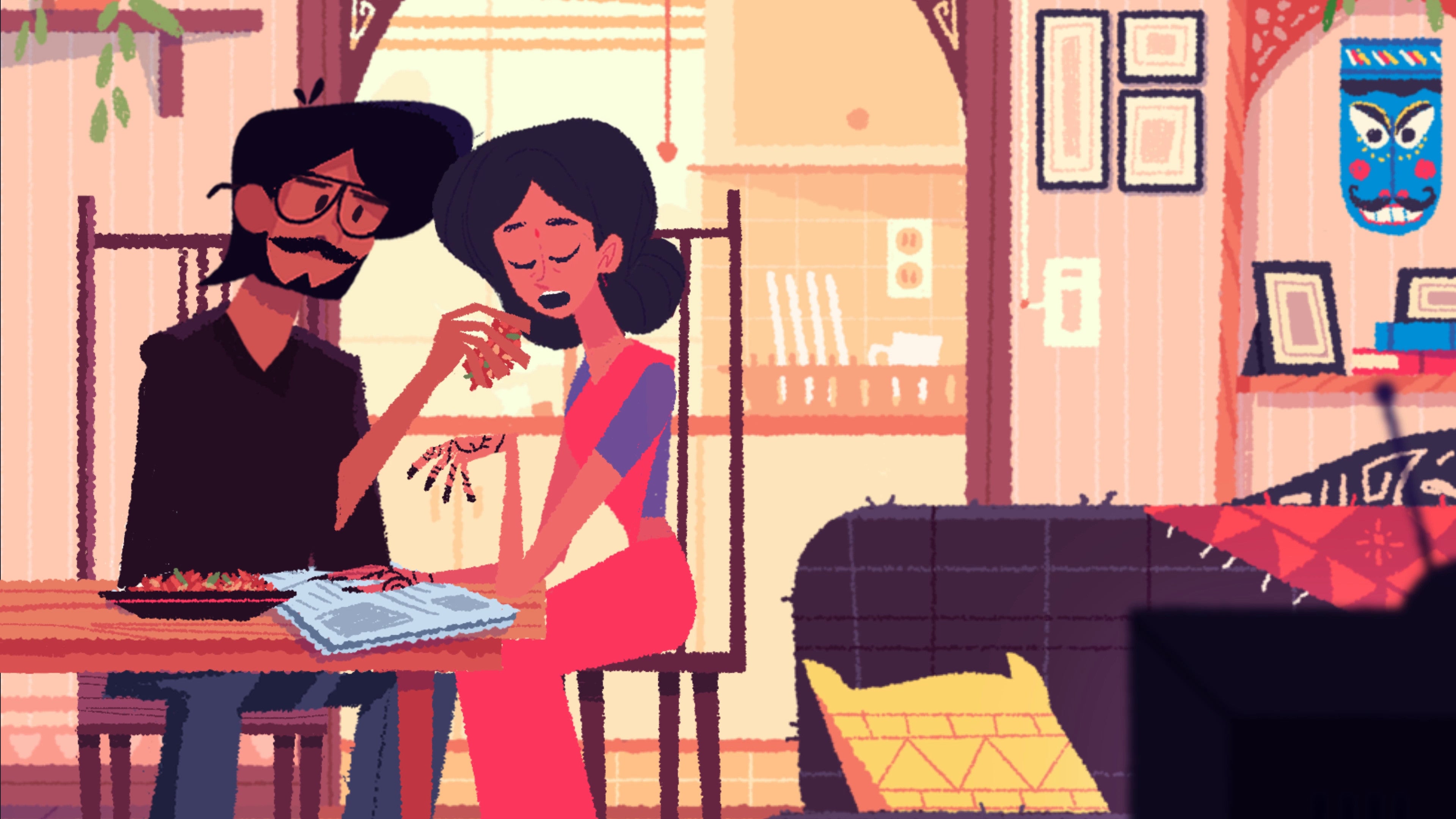It’s one of the emotions I’m wondering will be present in Venba, an upcoming cooking-based narrative game arriving this November from artist Sam Elkana and designer/programmer Abhi from Toronto. The story follows the life of an Indian immigrant mother in 1980s Canada, cooking for her family and having discussions with them. Speaking via Skype, Abhi’s explanation for making this the game’s centre seems both obvious and unique. “I personally find a lot of media that relates to immigrant stories, they tend to focus on the second generation kids - just the kids. But I think the parents have the cooler sorry to tell,” he argues. “Because they up and leave their country at the age of 40 or 50, and they move to a brand new place. So that sort of makes it super challenging for them and I think we’re not doing enough to keep that in mind. So Venba is more about exploring that relationship between these assimilated children versus their non-native parents.” Abhi moved to Canada with his parents at the age of 12, studying computer science before entering the games industry. His early experience already shows the mind of a games designer when I ask some of my questions, particularly about why he’s focussing on food. “I think food lends itself to gameplay mechanics really well. So when I thought about the way it’s going to carry the story, food automatically made sense…because the same family can be laughing at a dining table, sad or angry. But they all have to come together for that. Every day you’re cooking but the scenario around you changes, you’re all still there eating. I thought that it just felt natural and the story itself features the mother who is trying to bridge the gap with her son. And she’s trying to put all these unsaid words and emotions into the cooking. To me it felt that food was the best way.” This reminds me of the recurring “apologise like an ethnic parent” meme that often comes and goes on social media, which automatically brings in the default “come and eat” response that’s recognisable to so many, myself included. And although he explains the game’s emotional core so thoughtfully, it’s Abhi’s own interests as a foodie that reveal the game’s enthusiasm. “I’m the kind of person who would watch a bad movie if it has a cooking scene in it,” he says. I nearly interrupt him with a mention of Julie & Julia, but I realise that that is in fact, an excellent movie. “But on YouTube there’s a whole bunch of content creators from the state I’m from [Tamil Nadu] and they’re making all sorts of content. There’s this one channel, it’s called Village Cooking. It’s just a bunch of people cooking in a big village and it’s so cute because they yell the ingredients into the microphone, and they yell because they think it needs to get picked up.” This scenario is instantly recognisable, and I mention its similarity to older Indian and Pakistani immigrants defaulting to shouting on the phone, both in the present and years gone by. But if you’re like me - someone who can take 15 minutes just to make an omelette - it’s not always an easy time in the kitchen. I ask Abhi about the importance of demonstrating this. “So the first day [in the game’s story], I had the idea where it showcased how much labour cooking is, especially for mothers who from that time find themselves in that role, where they want to or not. And I show how laborious it is through gameplay, because you’re putting in the work to make those things. And I thought that’s the strength of this medium, so I’m really convinced the story will fit in here really well.” The game will apparently also involve filling in partial recipes, and Abhi has tried to create - or rather, recreate - particular dishes that would be ideal. “The fun thing is, for this game, I cook a recipe before I start. I research it and then figure what recipe lends itself into making a good puzzle. And then I cook it to really understand it. If the pandemic didn’t hit, the idea was to cook for the whole team and we’d all try and get an idea.” He says he’s noticed testers who cook are finding the gameplay easier, forcing him to make tweaks and changes as he gains more feedback. As for his cooking, I don’t shy away from asking about his abilities, and whether his own mother approves. “Yeah, she thinks I’m a good cook but I’m not gonna believe her, because I eat her cooking. And I know it’s so much better.” He stresses the story isn’t autobiographical, with the boy in the story being much more assimilated to western culture than he is. But asking what his parents think of the game so far brings up a huge serving of irony. “They don’t fully understand games as a medium yet. I’m only 27 but when they grew up, they played Mario back in the day when it came out in India, as a bootleg version. My mom tells me a story of how she even took days off work to complete that.” They eventually swore off video games as an addiction and never returned. He’s fine with this partially confused and apathetic opinion from his parents, stating, “I think if this game is out there, it’s a tangible real thing. And they’d start seeing the effects of it.” Eliciting empathy is the biggest ask for any creative person, especially if it’s in the form of a video game. What I find most exciting about Venba is that it’s aiming to do this through the most human route possible: food. Pixels and food have had a symbiotic relationship ever since this medium started. Adding a unique narrative has made this couplet one of the most enticing things that will arrive this year.

